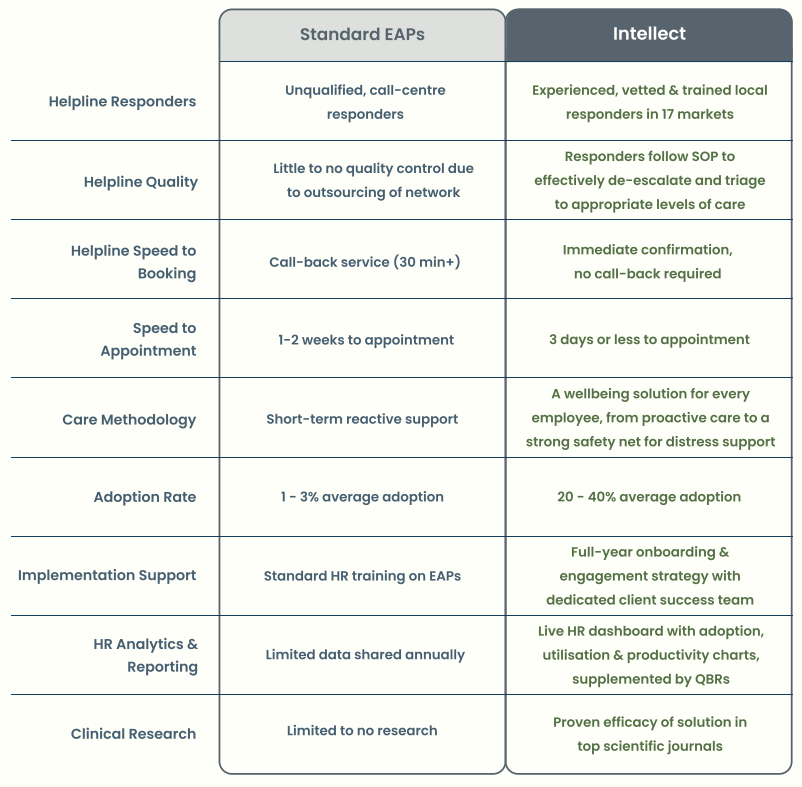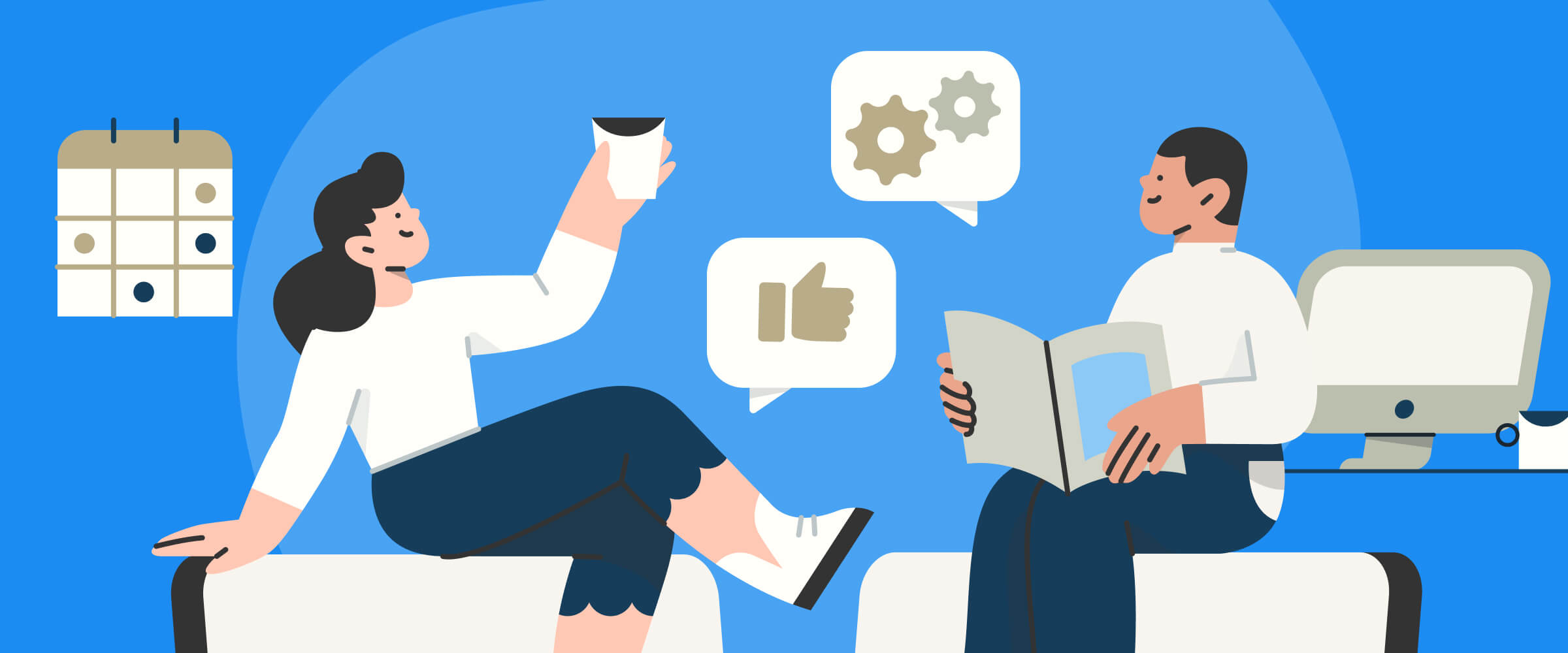Employees in Singapore and Asia-Pacific are demanding better mental health support in the workplace. As employees increasingly suffer from burnout and poor mental health, they’ve been prioritising jobs that offer mental health services.
We’re seeing the effects of this trend worldwide in the Great Resignation, with record numbers of dissatisfied employees choosing to leave unsupportive workplaces. This tipping point is pushing organisations to rethink their processes, and in APAC, employers are taking steps to prioritise wellbeing in the workplace.
There’s no lack of hard data on the negative impacts of mental health on organisational costs, from lower productivity to reduced employee engagement. Now more than ever, mental health needs to be at the forefront of a company’s priorities. But the question is: how effective are their existing Employee Assistance Programmes (EAPs)?
Are EAPs effective?

An EAP is an intervention programme for workplaces meant to help employees resolve personal or work-related concerns that can affect their performance. It usually covers mental wellbeing, nutrition, exercise, and chronic disease management.
In Singapore, EAPs trace their roots back to the early 2000s when the Ministry of Health established the Health Promotion Board. By 2010, one in four workplaces had begun offering a mental wellbeing programme. As Singapore pushes efforts to destigmatise mental illnesses, EAP providers listed with the Ministry of Manpower continue to increase. These EAP providers offer a range of services, such as providing hotlines for support, counselling, webinars, and mental wellness resources.
HR departments usually integrate EAPs into employee benefits packages as a way to provide extra support to their staff. However, employees usually reach out to their EAP providers in a reactive manner, only seeking assistance when the need arises.
Studies show that EAP utilisation averages a mere 3 to 6%. This makes the rise of mental health apps a welcome disruption to the landscape of employee benefits. Intellect EAP, for instance, has an average utilisation rate of 20-40%–a near-tenfold increase compared to traditional EAPs.
Why traditional EAPs have low utilisation rates

There are pros and cons to EAPs, but despite over two decades of existence, they’ve done little to alleviate the burnout epidemic locally (studies note that workers in Singapore are the most burnt out in Asia) and regionally. Why is that happening?
First, the lack of accessibility and ease of use have been cited as reasons for their low utilisation rates. Booking a therapy session can take up to six weeks–a long wait during which an employee’s mental health can deteriorate significantly. For the same reason, on-demand same-day appointments are among Intellect EAP’s most compelling offerings.
Secondly, traditional EAPs tend to be more reactive than preemptive. “Once an employee has problems, that’s the time they call. It encourages a behaviour of waiting until there’s an issue before seeking help,” Alicia Yoon, Client Success Lead at Intellect, further expounds. It’s no secret that mental wellbeing requires regular maintenance, and seeking treatment only when they’ve burnt out costs both employees and organisations. Furthermore, a limited number of sessions may not suffice in helping them get back on their feet.
Thirdly, the efficacy of traditional EAPs also suffers from a lack of localisation. Many cascade from a company’s global headquarters and, perhaps owing to poor communication, employees are sometimes unaware of them. Even global ones may not be culturally attuned. An employee who’s struggling with an Asian workplace culture or family dynamic, for instance, may not relate to a therapist based in the states. Intellect, on the other hand, bridges these gaps with a diverse pool of coaches and counsellors across the region.
Lastly, a traditional EAP’s triage process also puts users off. For assessments, users have to answer personal questions over phone calls that last up to 20 minutes. Yoon explains why this is a concern: “Employees feel that too much of their information is being shared with traditionalEAPs. So there are confidentiality issues as well. Users think, ‘what if my data is being shared with my organisation?’”
Intellect EAP, on the other hand, lays these concerns to rest with their Zero-Knowledge Encryption technology and compliance with Singapore’s Personal Data Protection Act (PDPA)—one of the strictest data privacy laws in the region.
Intellect EAP vs Traditional EAP – Key differences
“Organisations pay so much for traditional EAPs for only 0 to 1% utilisation. And in studies, employees are still stressed. Companies still have high turnover. There’s a big gap, a lack of awareness, and a huge stigma that must be addressed,” says Yoon.
Unlike traditional EAPs, Intellect EAP leans into prevention rather than cure. That means creating accessible solutions, from self-guided learning paths to rescue sessions and 1:1 counselling sessions. It’s more active than passive and nips the problem in the bud. On top of attending to employees in distress, they also help employees avoid it by developing healthier mindsets and behaviours.
This philosophy of helping translates into the following distinctions:

“We redefine the approach. In Intellect, we understand organisations’ and employees’ needs. We work closely with human resources to create a proactive mental wellbeing culture. Intellect is not just for mental health support. We offer a suite of solutions for mental wellness integration in companies,” says Yoon.
Mental wellness integration can be tedious, but Intellect has a roadmap tailored to employee and company needs. Its scope includes raising awareness; driving adoption; implementing workshops, webinars, and initiatives; providing feedback reviews; and impact reporting while, of course, keeping their users’ data confidential. As a result, Intellect EAP has a 10 times higher adoption and utilisation rate as compared to traditional EAPs.
For Schroders, sign-ups and active users increased by 28% in just three months, and nearly a fifth of employees used coaching consistently. At FoodPanda, 58% of employees reported an improvement in mental wellbeing after using Intellect. Closer to home, Shopback observed a 72% adoption rate, with over 56% of employees still actively engaged even after 6 months. If anything, these success stories attest to the evolving needs of a post-pandemic workforce.
Book a demo today and let Intellect serve your organisation the same way.








